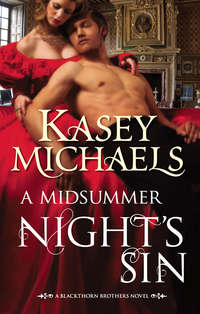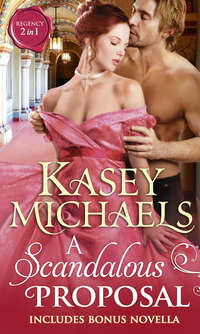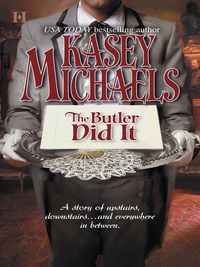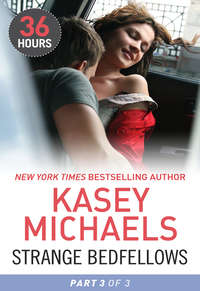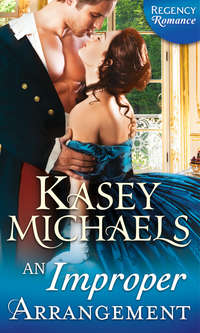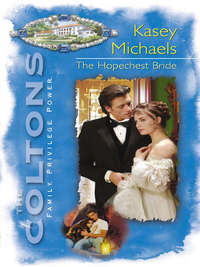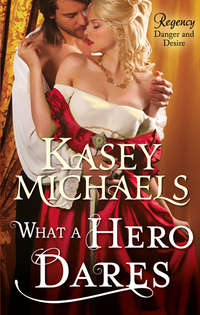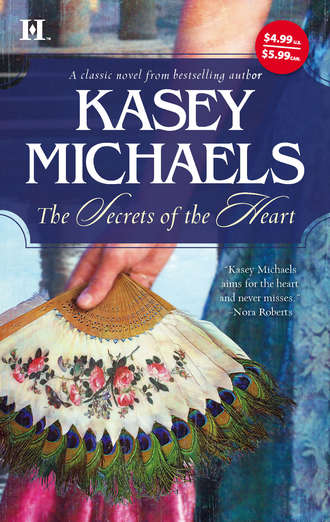
Полная версия
The Secrets of the Heart
Now Symington—backed by Lord Undercliff’s fortune—had openly declared that he would not buckle under pressure from the Peacock’s threats. Would Symington hire his own private army of brigands to seek out Christian and the rest of them? It wasn’t inconceivable. And how many more men, poor wretches like this Slow Dickie person, would be made to suffer for Christian’s ideals?
George felt ashamed of himself, hated himself for what he was thinking. He was close to seeing himself as Christian’s Judas, a disciple who loved him dearly, admired him for his good works and high ideals, yet feared for what his friend was doing in the name of goodness. Judas had turned his friend over to his persecutors in the conviction he was helping him, helping those who blindly followed, believing in salvation. Would it come to that? Dear God, don’t let it come to that!
“Grumble? Grumble!” St. Clair called out, laughing. “For the love of heaven, man, pay attention. You’re staring at that candy dish as if it contained golden nuggets. Why not just throw some into your mouth and have done with it? God’s teeth, but that’s revolting. Port and sugarplums,” he said, shuddering. “Now listen for a moment. Winnie has concocted an idea as to what to do about the problem of Slow Dickie. You must hear what he has to say. It’s priceless, Grumble, I promise. Absolutely priceless!”
George looked up, shaking his head to clear it, happy to avoid Christian’s gaze by pretending to concentrate on Sir Gladwin’s scheme. “I know I’m going to regret this, but—what sort of idea, Winnie?”
Sir Gladwin pulled a face, slicing a look at St. Clair. “I don’t know as how I want to repeat it, seeing as how Kit is grinning like a bear.”
“Well, it is different, old friend,” Lord Osmond piped up, winking at George. “Especially that part about dressin’ up poor Grumble here as a washerwoman and settin’ him down in the village square as lookout. Grumble—you think you could manage a wriggle when you walk?”
George rolled his eyes, sighing. How could he have been so stupid? Kit was no Christlike figure, and he, George Trumble, was no traitorous disciple. To think so would be nothing short of blasphemous. They were, all four of them, nothing more than overgrown children, perhaps a little more caring than some, and definitely more foolishly adventuresome than most—but still fairly ordinary, in their own twisted way. Unfortunately, they had placed themselves in extraordinary positions.
George reached for the candy dish. No wonder he ate so much, he thought, sighing again. If he didn’t, he shouldn’t have the strength to worry so much. “Never mind, Winnie. You’re right. I don’t want to hear it.”
Christian stood up, then leaned one arm negligently against the mantelpiece. “Very well, Grumble. You’re aptly named, I’ll grant you that. I suppose we should move on. After all, I have promised to grace the theater this evening and must soon begin considering my rig-out. Do you suppose the peach would suit? I shouldn’t wish to clash with the draperies.”
Sir Gladwin frowned, obviously considering St. Clair’s question as if it really mattered, which everyone else knew it didn’t. “I don’t know, Kit. Refresh my memory: What color are the draperies?”
George chewed another sugarplum, then quickly swallowed both the confection and his guilt. “Leave it, Winnie,” he said. “Kit’s only trying to muddle our minds so we’ll be confused enough to accept his plan to rescue this poor Slow Dickie fellow. You do have a plan bubbling inside that clever head of yours, don’t you, my friend?”
St. Clair nodded, then flashed his closest friend a bright smile as he took his seat once more, perched just at the edge of the chair, obviously eager to lay his plan out for his friends. “I never could fool you, could I, Grumble? Yes, I have a plan; one that will serve us in two ways. Grumble, Winnie’s notions of you as a washerwoman to one side, tell me: Are you up for a bit of play-acting?”
George stopped his hand inches from his mouth, the sugarplum hanging suspended in air as he narrowed his eyes, looking at St. Clair. “Why?” he asked, already sure he didn’t wish to hear his friend’s answer.
St. Clair leaned back in his chair, still smiling. “No real reason. Let’s just say there is a certain beautiful young lady whose keen intelligence I have never doubted but whose shallow priorities disgusted me. Let us also say that this certain young lady has now shown not only the usual hysterical female interest in the Peacock’s identity but also an unnerving acuity which must be deflected. In other words—”
“Don’t play the dandy with me, Kit. In plain words,” George interrupted, sensing danger, “Gabrielle Laurence is beginning to pierce your disguise—or thinks she is. Damn and blast, Kit, I told you to stay away from her. She’s not brick-stupid like Lady Ariana and the rest. And Miss Laurence is also not at all grateful to you for bringing her into fashion when she was determined to accomplish that feat on her own. I doubt she appreciates going to her bed each night wondering if the great St. Clair is going to cut her the next day, destroying her.”
“True enough, Kit,” Sir Gladwin added. “She don’t like you above half, and anyone with a clear eye can see it. And, the way Grumble tells it, I don’t know as how I can blame her. We all warned you not to tease the chit.”
“Ah, gentlemen,” St. Clair said, pressing his hands to his chest and raising his pitch a notch as he deftly employed the affected tones he used to such advantage in Society, “but I do so delight in her dislike.”
“Well, there’s always that, I suppose,” Lord Osgood said, winking as he snatched the candy dish from George, obviously not bothered that he too would be abusing his palate by mixing fine port with the sugary confections. “Though I never thought I’d live to see you tumble into love, Kit.”
“Love?” George exploded, taken totally off-guard. “Ozzie, however did you come up with such a ridiculous notion?”
“I didn’t,” Lord Osgood answered simply as George looked up at St. Clair in an assessing manner from beneath hooded eyes. “I just now remembered my Aunt Cora once tellin’ me I was top over tail in love with m’cousin Abigail because I was always pinchin’ her. Of course, we were both little more than infants at the time, and when Abby up and married that Dutchman last year I didn’t turn a hair. Never mind, Kit. Sorry I mentioned it.”
“Thinks nothing of it, Ozzie,” St. Clair answered, but, George noticed uneasily, for once his friend’s smile did not quite reach his eyes.
CHAPTER FOUR
La! Did you ever see such an unpleasant person?
I hope when I grow old I shan’t look like that.
Baroness Orczy
FRAPPLE, I’M SO DAMNABLY tired. All that dashing about from here to there last night, and no less than three different parties this evening, with everyone demanding my presence…” Christian trailed off wearily, collapsing into a chair in his dressing room. “I seem to remember hearing of some equally exhausted man putting a period to his existence some years ago because he had been so defeated by this constant dressing and undressing.”
“I shall have the kitchen staff sequester all the knives at once, my lord,” Frapple answered calmly, continuing to layout his master’s apple-green velvet evening clothes. “And don’t muss your breeches by slouching, if you please. Meg had the devil’s own time pressing them.”
“How good of you to worry so for Meg. Do I scent a romance in the air, Frapple?”
“Hardly, my lord. Riding herd on you at all hours, when would I find the time?” A tall, still ramrod-straight man of two and fifty, Frapple had been Christian’s trusted adviser and man-of-all-work since his lordship had been in short coats, and he did not frazzle easily. Indeed, as he was rumored to be the by-blow of the baron’s great-uncle Clarence St. Clair, he may have come by his flippant nonchalance quite naturally, just as he had come by his slowly graying blond hair and thin, aquiline nose. If it weren’t for the man’s mustache, and his more advanced years, in a dim light Frapple might even be taken for an older Christian.
In any event, Christian loved him as he would have the older brother he’d never had, and Frapple returned this affection, although he refused to allow his lordship to forget their very disparate stations in life.
Christian smiled now at the man he privately considered to be the best of his relatives, then yawned widely. “I won’t be returning home this evening, Frapple, if you wish to spare a moment for romance,” he said, raising his legs in front of him so that he would admire his new evening shoes. “I need to travel to Little Pillington to remind Herbert Symington of my existence. Thank God I’m known not to tarry too long at any one party, and won’t be missed. If I’m lucky, I should be in Little Pillington at least two hours before dawn.”
“You won’t allow yourself to be caught, will you?” Frapple asked, intent on examining his lordship’s chosen lace neckpiece for wrinkles before sighing, roughly stuffing the offending thing into his pocket, and removing its twin from the cabinet.
“Frapple!” Christian exclaimed. “Don’t tell me you’re worried about me.”
“Not in the slightest, my lord,” the servant answered, already heading for the door to the hallway, the apple-green velvet jacket in his hand. “It’s only that I’m much too long in the tooth to have to begin again with a new employer. Why, the man might even think I’d kowtow to him. Now, I’m just going to have Meg do something with this left sleeve. It’s rather crushed. Please, my lord, as I may be detained for some minutes, I must beg that you do not change your mind about your rig-out for the evening and endeavor to dress yourself. We both, I hope, remember the disaster that befell the ecru satin.”
Christian nodded and waved Frapple on his way, not wishing to revisit the subject of the form-fitting ecru satin jacket and the seam he had split in attempting to don it without aid, or even to think of any of his Society clothing.
If he had his druthers, which he of course did not, he would step back in time and attempt to bring into vogue a more comfortable, less constricting fashion than he had done in reinventing flamboyant Georgian dress. Thank God he’d stopped short of powdering his hair.
He rose from his chair and drifted into the adjoining bedchamber, seating himself at the desk he used when composing his weekly letters to the London newspapers. What would be his subject for next week? Would he tell of the mill workers he had seen who’d been crippled by faulty machinery, their thumbs mashed into useless lumps of nothingness? No. That might unduly upset the ladies, who did not appreciate detailed descriptions of gore served up with their morning chocolate.
Starving babies were more to the ladies’ tastes, Christian had already learned. The ladies could delicately weep into their handkerchiefs between helpings of coddled eggs and bemoan the fate of the “poor, wretched darlings” without having to do more than send off a bank draft to one of the local orphanages. It was so morally uplifting, this generosity that soothed their shallow consciences and that cost them nothing but money.
Christian propped his elbows on the desktop and rested his head on his hands. He was tired. So tired. And it had little to do with the endless social whirl, his private missions, or even the strain of keeping his two identities separate from each other.
He was tired of the poverty, the heartache, the sad, hollow eyes and the crying mothers. He was tired of hearing about men such as Slow Dickie, being beaten merely because he could not defend himself against being beaten.
He was exhausted by the futility of saving a few while the many still suffered. He was weary of this back-door subterfuge meant to waken his peers to the desperate plight of those they would call the “solid English citizenry.”
But mostly, Christian was angry. How could his fellow peers be so blind, so damnably selfish, so fearful of the masses that they would be foolish enough to incite them to insurrection?
His peers. Idiots! Jackals! The whole bloody lot of them! Christian slammed a fist against the tabletop, jarring the small lidded crystal bowl holding his supply of ink. All they cared about was the cut of their coats, the latest gossip, and clinging to their supposed superiority with all their might.
When Christian went into Society he did it to hold up a looking glass to their foibles, showing them with his own overdressed, overly impressed-with-himself posture the folly of worshiping such cultivated shallowness and hoping they would somehow summon up the brainpower to compare their pampered, wasteful, wasted lives with the majority of their countrymen who had to scrabble for their daily bread.
Yes, he had pricked their consciences. Yes, a few of them now interested themselves in good works. Yes, they slyly ridiculed Lord Sidmouth as they went down the dance, tsk-tsking at his insistence upon championing the master over the servant. But they did it only to mimic the popular Baron St. Clair, to show their wit, and to prove their “humanity.” Not a man jack of them had yet dared to stand up in Parliament to say a word against either Lord Sidmouth or his oppressive edicts.
Christian balled his hands into fists, feeling wave after wave of angry impotence wash over him. Setting himself up as the leading influence in Society had not been enough. The letters had not been enough. Only when the Peacock had begun to ride had any real changes come to places like “Mud City” and other squalid manufacturing villages in the Midlands.
Only when Christian had escalated his mission from cajoling, to eloquence, to violence, had most of the ton even acknowledged that there might be some real injustice to be found in the oppressive Corn Laws and the working conditions in the mills.
And still they didn’t really understand. Instead of emulating the Peacock, Society had decided to be dazzled by him, and to set themselves the project of discovering his true identity.
What a waste. What a damnable, damning waste! And for what? A few dozen pairs of clogs? One more crust of bread for the sad-eyed, stick-thin children of the mill workers? One less hour of near slavery in an already interminable workday?
Christian could see the growing disillusionment in George Trumble’s eyes, sense the unspoken questions, the quiet censure. Their mission, begun with such enthusiasm, such purity of purpose, had grown almost beyond their control, the tail now beginning to wag the dog, their ever-increasingly dangerous exploits demanded by an easily distracted Society’s hunger for more adventure, more excitement, more titillation, more, more, more.
And now Herbert Symington and his partner, the powerful if obtuse Lord Undercliff, had dared to challenge the Peacock’s one great success. Turning fire-starter had not been pleasant for Christian, but what had been an impulsive ploy had immediately proved effective. Mill owners were beginning to ease their stranglehold on their workers on their own, in the hope the Peacock would then spare their houses, their possessions.
However, if Christian were to allow Symington to best him, the work of these last six months—indeed, the success of the past year and more—would all vanish in the twinkling of an eye.
For Christian knew Society now, had learned all about it at the knee of the disenchanted Brummell, and he recognized that English Society loved only one thing more than raising a person onto a pedestal.
That one thing, as Brummell’s disgrace had shown so clearly, was to topple him off again.
And if Christian St. Clair were to fall, if the Peacock were to fail, then the poor would have no champion left to them. Men like Slow Dickie would have put themselves in jeopardy for nothing.
Was it any wonder Christian was so tired? Tired, and disillusioned, and thoroughly disgusted with his fellow man. Was he the only person in London with the intelligence to understand that, unless something were done to alleviate the suffering of the many, it was inevitable that the privileged few would eventually become equal victims of their degenerating civilization?
England was stunting the physical and spiritual growth of an entire generation, a generation of children uprooted from their farms and villages and forced into slums, away from sunlight and open fields.
An entire generation was being raised without mothers close by to teach them, without seeing the inside of either church or school, watching their mothers and sisters turning slattern with poverty, their fathers and brothers either beaten down in the mills or becoming hard, cruel, reckless men whose only ease came either in a pint of cheap gin or in bashing one of their fellows senseless for no other reason than violence brought with it a modicum of power.
Yet in London the chandeliers still glittered, the supper-room tables groaned beneath piles of exotic foodstuffs, the sound of music, and laughter, and the rustling of silken skirts, echoed throughout ballrooms from one end of Mayfair to the other.
Lords still drove to Newmarket for the races, their ladies still spent lavishly on dinner parties and routs and soirees, young men lived for the turf and table, and silly debutantes still whispered behind their fans, their minds filled with nothing but the anticipation of securing themselves wealthy husbands who drove to Newmarket for the races so that they could stay home and spend lavishly on dinner parties and routs and soirees.
Christian leaned back in his chair, all this deep thought giving him the beginnings of a headache. Foolish gentlemen. Spendthrift ladies. Posturing, preening young lords. And feather-brained, mercenary young debutantes. All of them not worth one Slow Dickie and his fight for survival. The devil with all of them!
“And the devil with Gabrielle Laurence,” Christian said out loud, startling himself with his vehemence.
Gabrielle Laurence. So startlingly beautiful, so unusual. So very intelligent—or at least he believed she could be as he’d watched her shift her brilliant green gaze around the ballroom, obviously mentally measuring everyone she saw. But even Gabrielle, whom Christian had discovered the very first night of the Season, had quickly shown herself to be no more than another pretty shell washed up on the glittering beach of the ton, with nothing of substance, of worth, inside her.
Oh, yes, she was bright, even witty. But her aspirations rose no higher than making herself the Sensation of the Season and then snaring a brilliant match with some wealthy, titled gentleman. Still, Christian could not quite lose his fascination with her, could not cease wondering how it would feel to hold her, how she would taste if he kissed her, how those lovely green eyes would open wide as he introduced her to ecstasy.
And so he’d employed his social consequence to give the fiery-haired Original what she wanted, just to find himself despised for his helpful intervention—which fascinated him ever more.
George had been correct to say that Gabrielle did not appreciate being in Christian’s debt. Gabrielle, whose dowerless state had made social success nearly impossible on her own, must have recognized the very real possibility that the powerful St. Clair’s favor could be withdrawn at any time, leaving her just another hopeful debutante. Or even less in fashion than the other young ladies making their debut, as she would then be plagued with two problems: her unusual and unfashionable red hair, and St. Clair’s defection, which would cause others to shun her.
Gabrielle’s quick understanding of her precarious position, that of having her continued success depend upon the whim of a man she so obviously loathed, had served to reinforce Christian’s conclusion that beneath that beautiful shell there was at least the possibility of intelligence.
Over these past two weeks he had become convinced of it. Her daring when they were alone, her deliberate baiting of him in ways that no other person save the inimitable Frapple had dared since his ascension to the pinnacle of social power, had shown him that Gabrielle Laurence was his match in many ways. Which had served to make him even more angry with her.
She, a young woman who was not poor but yet not nearly as wealthy as most debutantes, should know that the social whirl was a hollow world. She, of anyone he had met, possessed the intelligence to thoroughly disdain this same social whirl and apply her great resolve and determination to more substantive matters.
Of course, there was also this business of how she disliked him—never failing to describe him as a brainless dandy more worried over the cut of his coat than anything else.
Did she loathe all men?
She said she didn’t, reserving her disdain exclusively for him. But there was something—some negligible something—that told him that she knew this was all a game, that Society itself was a pawn in that game, and she played at it only because she was a woman, and if it was the only game she was allowed to play she was determined to be the clear victor.
Unfortunately for Christian, he was beginning to believe Gabrielle had discovered another game, and she was out to win that one as well. That game? To discover the identity of the Peacock. It wasn’t as if everyone else hadn’t already figuratively signed on for a turn at this contest, everyone in Society agog to know the Peacock’s identity. But everyone else only toyed with the game, contenting themselves with wild guesses and the “romance” of the thing.
Gabrielle Laurence was playing the game in earnest, whether in order to cement her position in Society without having to worry about continuing to curry Christian’s favor or because reigning over Society had been too easy a success and she was now looking for another challenge, Christian did not know.
He knew only that she had come dangerously close to seeing beneath the veneer of his social pose, to catching his verbal slip the other night and immediately pouncing on it. Lady Ariana hadn’t noticed. Christian doubted that anyone of his acquaintance save George would have noticed. But Gabrielle had.
“Which either proves that she is as intelligent as I thought, causing me to dislike her more for choosing to expend that intelligence so wastefully,” Christian mused aloud, “or makes me a wishful fool, looking for more than is there and hoping against hope that the beautiful Miss Laurence fits the image of a woman I could love.”
“Or,” Frapple said from behind him as he entered the room, holding the apple-green velvet jacket in front of him as if it were the Holy Grail, “you are a lustful rutting dog like your Uncle Clarence, hot to bed a lovely lady, but trying to tell yourself you are different from him, and above such animal urges.”
“That too.” Christian turned slowly on his chair, one side of his mouth rising in a rueful smile. “Educating you may have been a mistake on my part, Frapple,” he observed quietly. “Not only do you insult me, but you do it with great articulation. I should sack you for insubordination, you know.”
“True, but then who would dress you, my lord?” Frapple motioned for Christian to follow him into the dressing room. “We must hurry,” he told his employer. “Lord Buxley is below, asking to see you.”
“Lord Buxley?” Christian repeated questioningly as the servant helped him shrug into the tight-fitting jacket. What did that sober Tory prig want with him? Or had the incident at Lord Undercliff’s caused suspicion in someone other than Gabrielle Laurence?
Damn and blast! He didn’t need this now. He was to visit Little Pillington tonight, not have one of Sidmouth’s staunchest supporters tagging at his heels so that he could not chance leaving Mayfair. “Deny me, Frapple.”
“I do, my lord, as often as possible. St. Peter in all his disgrace could not deny his master more,” Frapple replied flippantly, giving Christian a sharp tap on each slightly padded shoulder as if to be sure the coat fit securely. “However, in this instance, his lordship will not retire. He says he is on the King’s business.”
Christian chuckled low in his throat, laughing in reaction to both Frapple’s irreverent wit and the thought that Lord Anthony Buxley would stoop to using the King’s name to gain access to the mansion.


